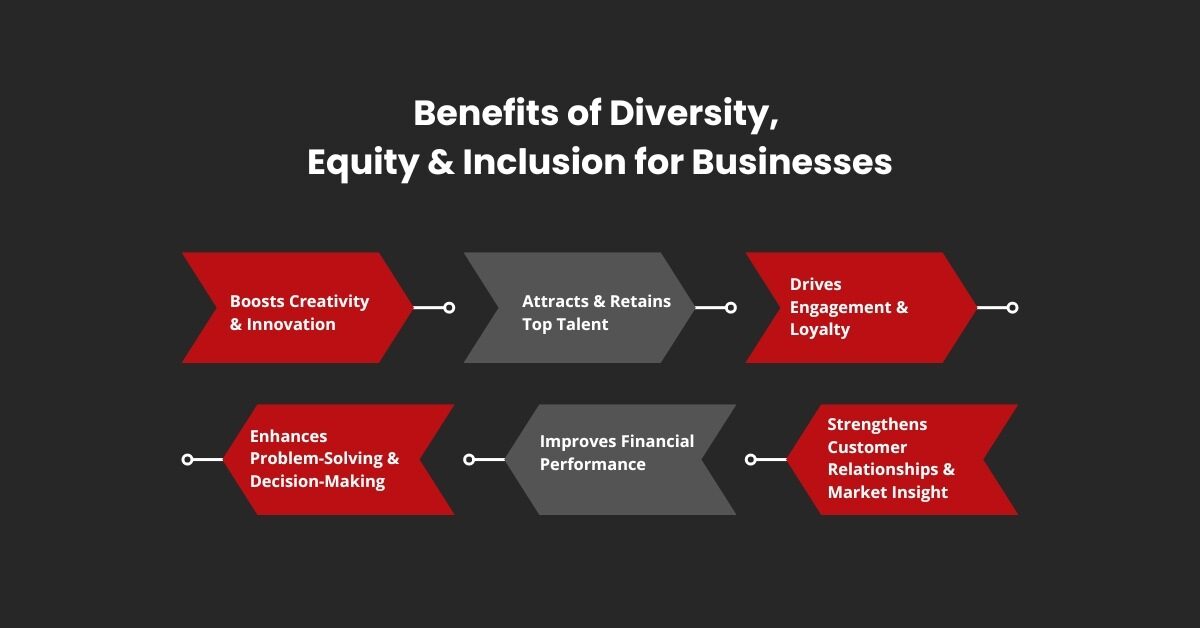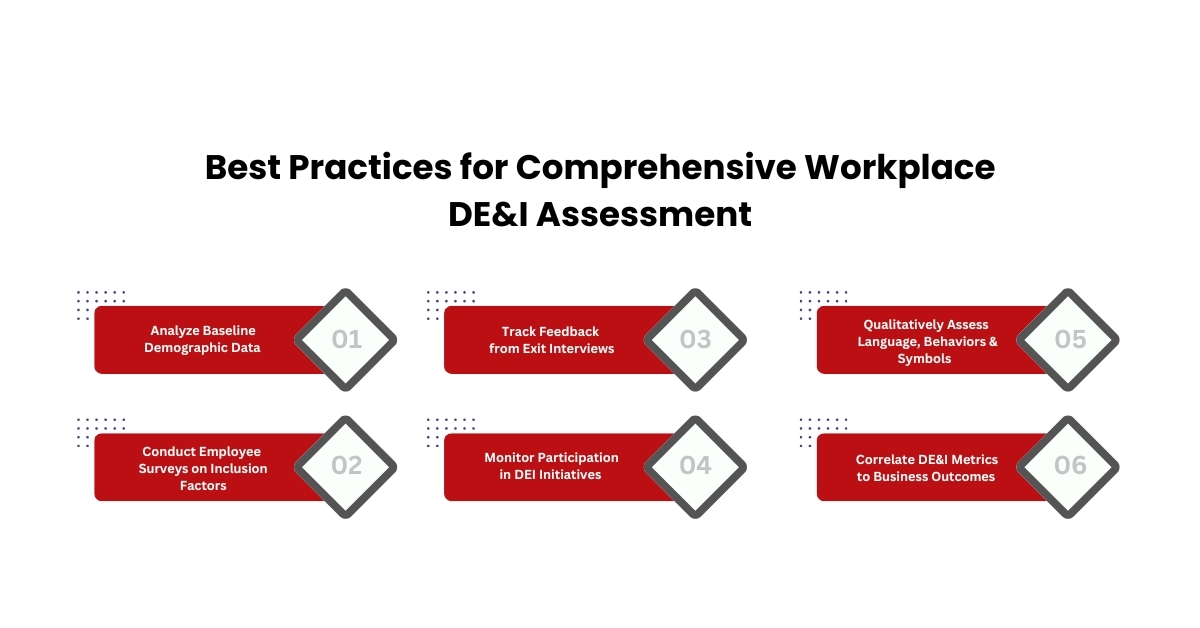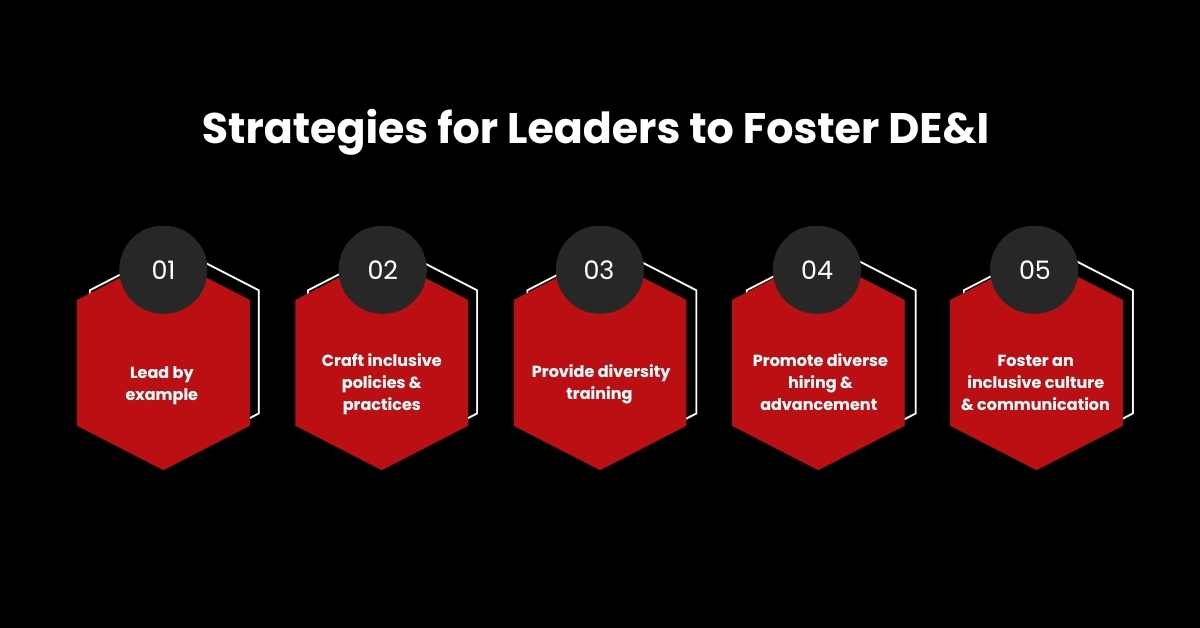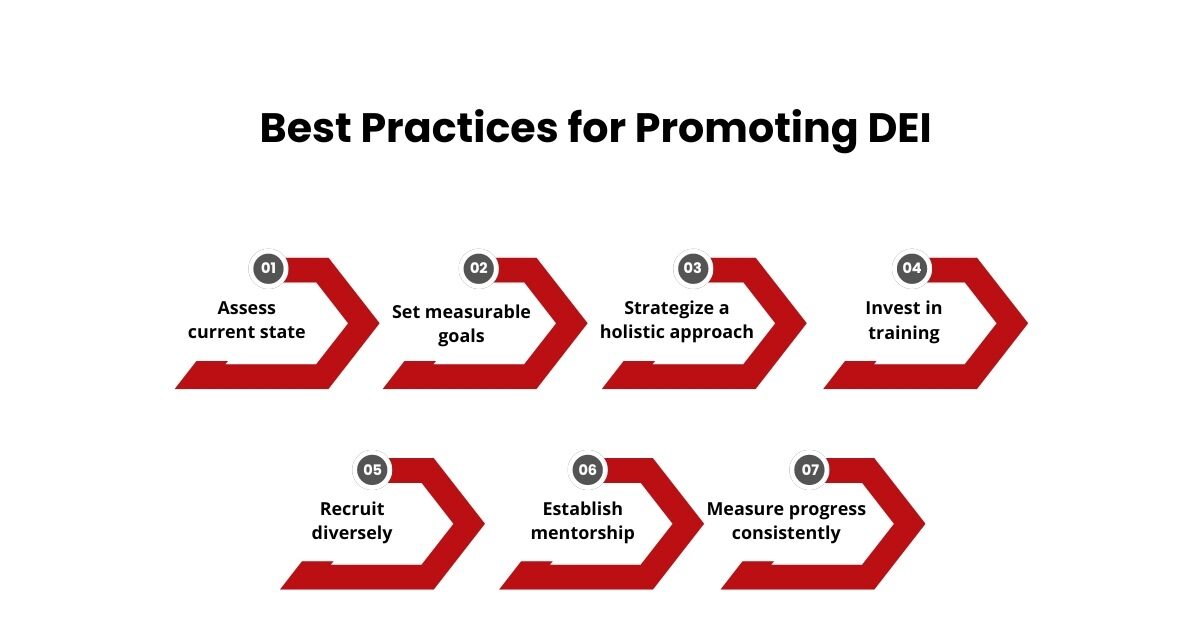Attracting top talent and optimizing company culture are vital goals for any successful organization. In today’s competitive job market, promoting diversity, equity, and inclusion (DEI) has become a priority for many forward-thinking companies that recognize its myriad benefits. A commitment to DEI helps businesses leverage the full potential of their employees, fuels innovation and performance, and strengthens an organization’s reputation as an employer of choice.
This article will delve into why prioritizing DEI matters for both workers and the bottom line. We’ll take a deep dive into defining diversity, equity, and inclusion, exploring their interconnections, and outlining specific ways they boost company culture, engagement, and results.
We’ll also outline effective DEI measurement strategies, the pivotal role of HR, leadership tactics, overcoming challenges, and best practices. The goal is to paint a comprehensive picture of how DEI can give businesses a competitive advantage by powering an inclusive workplace culture where all staff feel valued and inspired to excel.
Diversity refers to differences in gender, ethnicity, age, abilities, and more among a group of individuals. While companies may tout a diverse workforce on paper, inclusion is the active engagement and valuing of all employees. Equity is about fair and just treatment regardless of identity. Simply put, DEI ensures that hiring is just the start - that belonging, respect, and opportunities are extended to all.
Diversity alone does not guarantee inclusion or equity. An inclusive environment is not inherently diverse, either. For DEI to meaningfully take root, these facets must be interwoven at every level. Only then can benefits like innovation, retention, and reputational gains be fully realized.
Promoting an inclusive culture where people from all walks of life feel empowered to contribute their unique skills and perspectives provides clear competitive advantages. Below, we outline some of the top ways that prioritizing DEI rewards businesses:

Bringing together diverse groups stimulates novel ideas and solutions that more homogeneous teams lack. By leveraging diverse life experiences and expertise, companies uncover pioneering innovations. Research shows firms with diverse leadership generate higher innovation revenue.
In today’s job market, where people have more options than ever, a strong DEI reputation is a major magnet for attracting sought-after recruits from all backgrounds. Staff are also more apt to remain at companies that respect differences and champion inclusion.
When people feel respected for who they are, they are more emotionally invested in their employer’s success. DEI improves empowerment, motivation, and attachment - instilling in employees a desire to contribute at their fullest capacity and helping retention.
Diverse perspectives ensure issues are examined from multiple angles rather than a single viewpoint, leading to optimal solutions. Research shows diverse groups consistently outperform homogenous ones on creative and complex tasks.
A 2019 McKinsey study found that companies in the top quartile for gender diversity on executive teams were 25% more likely to experience above-average profitability. Similar correlations have been observed across various dimensions of diversity.
A diverse workforce aids understanding of an equally diverse customer base, helping shape offerings that resonate across many demographics. Customers feel understood and may develop brand loyalty as a result of companies authentically representing the communities they serve.
DEI is deeply intertwined with a positive company culture that enables people and businesses to thrive. Below are some ways diversity, equity, and inclusion foster a powerfully cohesive culture.
Clearly conveying DEI’s importance via core values and strategic documents like mission/vision statements ensures it remains a priority consistently embodied in decisions and day-to-day operations.
Employees are more productive and creative when they feel psychologically safe and respected and that their presence and perspectives are valued rather than tokens. DEI directly develops this inherent sense of belonging.
Authentic leadership at executive levels that models inclusive behaviors sends an unequivocal signal that DEI is a top-down organizational imperative, not just important “on paper.” This spurs voluntary buy-in.
A culture where differences are celebrated, not avoided, makes for richer internal communications and team dynamics strengthened by understanding each other despite varied backgrounds.
Exposure to diverse ideas stimulates continuous learning as assumptions are challenged and new ways of thinking surface in a mutually educative environment that fuels personal and company-wide evolution.
A DEI-focused culture ensures fair treatment and equal access to resources for all. This helps build internal and external trust while discouraging misconduct stemming from exclusion or bias. Business is conducted in a principled manner valued by society at large.
Diversity is easy to track through metrics like representation in hiring, but true inclusion is subtler and requires sophisticated measurement. Gauging DE&I progress demands mixed qualitative/quantitative approaches tailored to company goals.

Audit current diversity breakdowns across job levels and locations. Benchmark against industry/community for credible goal setting. Periodically revisit to gauge hiring and promotion patterns supporting equity.
Confidentially survey the inclusion “pulse” by gauging employees’ sense of belonging, empowerment, fairness, and ability to contribute authentically. Identify at-risk groups. Regularly re-administer to track shifts.
Analyze why people, especially those from underrepresented groups, are leaving. Watch for patterns pointing to inclusion gaps worthy of intervention. Equip managers to broach DEI delicately.
Analyze enrollment, particularly across identity dimensions, in skill development programs, mentorships, business resource groups, and other inclusive offerings. Seek laggard involvement.
Stay alert for microaggressions, biased language, or symbols that do not respect everyone. Promote processes where any staff member can confidentially flag concerns assessed through an equity lens.
Analyze whether improved representation, inclusion scores, or other factors tie to amplified creativity, customer satisfaction, reduced turnover, or other win-wins. Tell a compelling return on equity story stakeholders truly understand.
Human resources plays a strategic function in cultivating the appropriate DEI-focused culture and driving organizational evolution. Key responsibilities in this sphere include:
Translate company values and leadership messaging into programs, policies, and everyday practices resonating across levels and locations. Routinely reiterate DEI importance.
Source candidates from a wide array of communities and schools. Train managers on inclusive hiring and language. Provide upward mobility mentoring for high-potential candidates from underrepresented groups.
Orient new joiners to DEI vision and resources like business groups in onboarding. Ensure all locations have proper facilities and holiday/prayer accommodation reflecting diverse needs.
Curate development opportunities, including skill-building, ongoing discussions, and external conferences, broadening cultural awareness and competencies to implement DEI most effectively.
Establish trustworthy reporting channels, like anonymous tip lines and advocacy networks, for equity concerns. Guard against retaliation via clear anti-harassment policies.
Regularly audit data, oversee goal tracking and incentive programs with an equity lens, address inconsistencies, and recognize exemplary teams/managers driving inclusion.
Collaborate with top brass on setting diversity objectives and communicating progress openly while troubleshooting issues flagged in engagement surveys threatening the DEI vision. Ensure accountability.
Fostering diversity, equity, and inclusion is crucial yet challenging for leaders and organizations. Intentional efforts are required, as DEI will not emerge spontaneously. Leaders must accept responsibility and show long-term commitment, even when facing obstacles. A systemic approach is needed to implement positive change comprehensively.

Leaders must demonstrate DEI commitment through their own behaviors and actions. Inclusive leadership training can help promote openness, build bias awareness, and empower others. Leaders who champion inclusion boldly set the right tone from the top.
Organizations should establish comprehensive DEI policies paired with equitable processes, ensuring fairness for all. Policies must be regularly reviewed and updated to address evolving needs.
Regular training sessions raise awareness about unconscious bias, microaggressions, and DEI importance. It is the duty of leaders and firms to equip staff with bias-challenging skills.
Audit recruitment practices and address bias in criteria and interviews. Expand applicant pools. Mentoring and sponsorship programs further back underrepresented talent.
Build a psychologically safe work environment valuing open discussion and collaboration. Establish employee resource groups or affinity networks celebrating different cultures to bolster community and support among employees.
Resistance to DEI emerges from various factors rooted in culture, beliefs, or perceived threats. Despite the backlash, parity must be pursued. Identifying reasons for resistance is crucial before implementing a strategy.
Some lack DEI benefits or underrepresented challenges awareness. Unconscious bias negatively impacts decisions and contributes significantly to resistance. Recommendation: provide education through diverse training, workshops, and leadership resources.
Change inevitably stirs discomfort. Communicate why change matters clearly. Highlight the benefits of inclusion for business and society. Ease transition through open discussion and flexibility. Address specific concerns respectfully.
There is skepticism that DEI exists only to fulfill quotas or follow trends. Authentic commitment and continual effort build trust and change aim higher. Implement holistically, not as a series quota fulfillment.
Those accustomed to privilege may feel inclusion threatens status. Challenge notions of “meritocracy” by spotlighting unearned advantage or oppression faced by others. Empower traditionally marginalized voices.
Businesses promoting DEI reap social responsibility and progressive reputation benefits. A diverse, inclusive workforce attracts supportive customers, clients, and investors. Society also gains from more equitable, well societies through spillover effects. The following evidence-based practices optimize outcomes:

Building truly diverse and inclusive workplaces necessitates ongoing commitment from leaders. They must view DEI as a long-term strategic priority rather than a passing trend and addressing resistance constructively. Organizations reaping DEI benefits establish it as a core value through evidence-based best practices comprehensively and authentically implemented. Businesses promoting parity and belonging gain a competitive edge, attracting top, diverse talent while contributing to a fairer society.
This website uses cookies to enhance website functionalities and improve your online experience. By browsing this website, you agree to the use of cookies as outlined in our privacy policy .